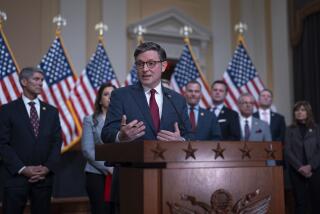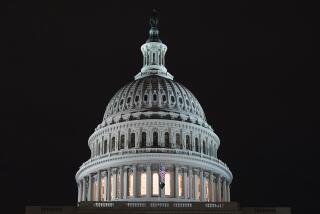Clinton, GOP Agree to Terms of Budget Talks
President Clinton and Republican leaders tentatively agreed Tuesday to a new round of top-level budget talks that rely on a method of economic forecasting that could strengthen the Republicans’ hand.
After a two-hour White House meeting, officials announced plans for negotiations that will personally involve Clinton and will take up various budget blueprints prepared by congressional Republicans, the president, conservative Democrats and a new Democratic plan that is under development in Congress.
Each component of the plans will be evaluated using the cautious economic forecasts developed by the Congressional Budget Office, which are preferred by the Republicans.
White House officials asserted that the use of these forecasts reflected the need to compare the plans on the same terms. The White House has relied on forecasts that assume faster economic growth and lower government spending--estimates that suggest the budget can be balanced without making cuts in projected spending as deep as those sought by the Republicans.
“If they’re going to have this discussion, they need to be able to compare apples to apples, which means that any proposals that are being discussed at the table have to be scored by CBO,” said White House Press Secretary Mike McCurry.
But aides acknowledged that this approach could at least give the Republicans a rhetorical advantage since they will be able to argue that Democratic blueprints based on more optimistic forecasts will not eliminate the deficit in seven years, a goal that both sides have signed on to.
For example, Clinton’s latest budget-balancing plan calls for savings of $124 billion from Medicare over the next seven years. But the CBO analysis concludes that Clinton would squeeze less than $100 billion from the program, a conclusion that would force officials to find extra savings elsewhere.
Sen. Kent Conrad (D-N.D.) called the agreement on use of the CBO forecasts a “very significant concession.”
House Speaker Newt Gingrich (R-Ga.), who met at the White House with Clinton and Senate Majority Leader Bob Dole (R-Kan.), declared that the agreement on the use of CBO numbers was a significant step.
“There is absolute agreement that everything that will be discussed starting tomorrow will have been scored by CBO,” Gingrich said.
White House and Republican officials hope to reach a final agreement today on the details of the new round of meetings. A preliminary logistics meeting was held Tuesday night between White House Chief of Staff Leon E. Panetta, House Budget Committee Chairman John R. Kasich (R-Ohio), and Senate Budget Committee Chairman Pete V. Domenici (R-N.M.).
Agreement to continue those talks could also reopen the government offices that have been closed since Saturday, when temporary funding ran out to operate the government while the budget battle continued.
Officials said that if the two sides agree to the shape of the negotiations today, they would enact a new temporary spending measure that would again provide money for government operations while the two sides complete what they hope is their final work on the omnibus budget bill.
Still, officials were cautious in describing the prospects for the new round of talks, suggesting that some important obstacles may remain. In the two-hour session, there was “considerable discussion” about the economic assumptions issue, McCurry said.
“Some of this is clearly in motion, and it will be resolved” today, he said.
Dole and Gingrich called the session constructive.
“It’s a big step,” Dole said. “We’re serious about this now.”
The GOP leaders also said that Clinton had committed himself to being personally engaged in the negotiating process.
Dole said “there are at least five, six, seven categories where the leaders are going to be directly involved, the president is going to be directly involved.”
Neither commented on whether they had accepted or rejected the two options Clinton presented Monday--either that they enter negotiations with no preconditions or that they would accept Clinton’s position on Medicare and Medicaid. However, Gingrich said they had agreed to produce a seven-year balanced-budget plan, scored by CBO, that “respects the priorities of all sides.”
Asked what helped break the impasse, a senior GOP aide said it had become clear that Republicans were determined to keep Congress in session until the deal was struck. “The Democrats got it, that we’re not leaving town until we got things done.”
However, Sen. Tom Daschle (D-S.D.) denied that there had been any substantive agreement at the White House meeting.
“There is not agreement tonight,” Daschle said. There is simply an understanding, he said, that the two sides will try to reach decisions today on three basic areas--the continuing resolution, the schedule and framework of the talks.
Dole said that Congress might take a brief recess after Friday and come back to work on Tuesday or Wednesday after Christmas “and try to finish by New Year’s Eve.”
The GOP leaders said they were not sure whether they would pass a spending bill to end the partial government shutdown until after they see how talks are proceeding.
Gingrich suggested that Clinton had committed himself to reaching a budget agreement before the end of the year--a goal that likely means Congress will have to return to Washington next week rather than adjourn for a longer post-Christmas recess as originally planned.
“There is an agreement that we will get this done before the end of the year,” Gingrich said.
Dole later backed away from saying the deal would be done by New Year’s. “I’m not certain that’s possible,” he said.
Before the White House meeting, Democrats and administration officials continued to work behind closed doors to put finishing touches on a new budget plan that they may present to the Republicans if negotiations get off the ground. The plan is designed to meet the Republicans’ demand that the Democrats produce a budget that balances in 2002 according to the more conservative assumptions of the CBO.
Democrats familiar with the plan cautioned that the details were in flux but that it would probably include a tax cut of about $60 billion to $69 billion. The plan is also expected to raise about $50 billion by closing tax loopholes.
Democrats familiar with the plan said that most of the additional savings being sought by Clinton would come not from entitlements, such as Medicare and Medicaid, but from domestic discretionary programs.
Sen. J. James Exon (D-Neb.) said that many of the savings in the new Clinton budget would be “back-loaded”--that is, heavily concentrated in the sixth and seventh years of the seven-year plan. That would postpone the most painful cuts until after Clinton left the White House--even if he won a second term.
More to Read
Get the L.A. Times Politics newsletter
Deeply reported insights into legislation, politics and policy from Sacramento, Washington and beyond. In your inbox three times per week.
You may occasionally receive promotional content from the Los Angeles Times.








